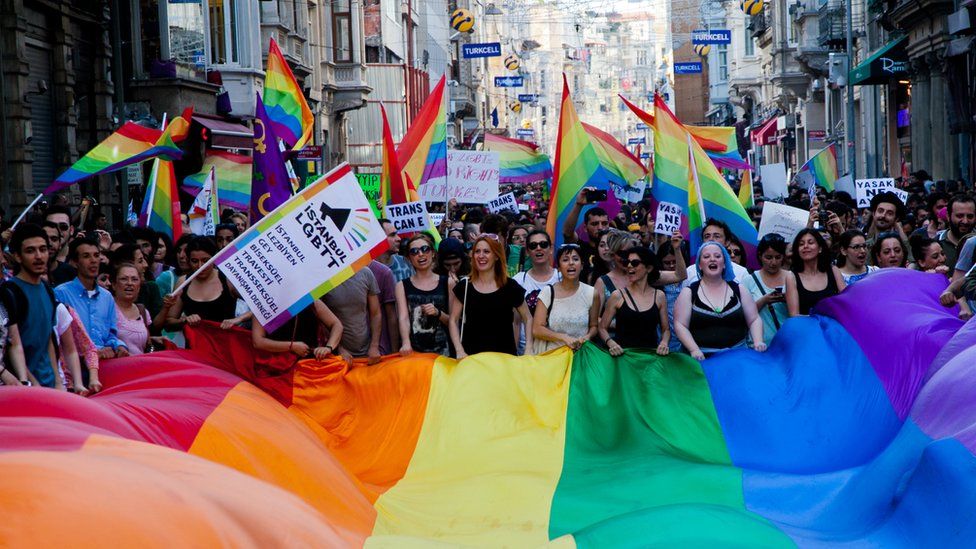LGBTQIA+ travelers are those who identify as lesbian, gay, bisexual or transgender, plus queer or questioning, intersex or asexual individuals. It also includes those who identify beyond these commonly used sexualities and gender expressions. Everyone has the right to feel safe, so we’ve put together a quick guide to safety for LGBTQIA+ folks traveling in Turkey.
Turkey has a complicated history when it comes to the rights of lesbian, gay, bisexual, and transgender (LGBT) people While homosexuality itself is legal, LGBT individuals still face many challenges and restrictions that their heterosexual counterparts do not
A Brief History
During the Ottoman Empire, before the 19th century, sexual relations were not defined by gender but rather by active and passive roles. Same-sex relations were permissible if legitimacy was established in a pederastic context. However, by the late 19th century, focus had shifted to relations with women.
When the Ottoman Empire transitioned to the Republic of Turkey, discrimination against LGBT people was initially enforced through vaguely worded morality laws. The 1980s saw increased pressure for LGBT individuals to remain closeted, evidenced by many later interviews.
Things began changing in the 1990s. Organizations advocating for LGBT rights formed, and Turkey saw its first openly gay public figures. The first attempted Istanbul Pride parade was blocked in 1993, but by 2003 Turkey hosted its first Pride event Participation rapidly grew, attracting over 100,000 people by 2013.
Current Legal Status
Today, homosexuality is legal across Turkey and the age of consent is equal. Discrimination protections do not exist, but gender reassignment surgery has been legal since 1988. However, same-sex unions receive no legal recognition.
The military openly discriminates, barring LGBT individuals from serving. Conscription applies to all male citizens from 18-41, but the military labels homosexuality as an illness making gay men unfit to serve. Humiliating exams have been used as proof.
In 2009, the EU Commission on Enlargement reported that LGBT people face workplace discrimination, with some fired for their orientation. Law provisions against public morality are discriminately enforced.
Changes in Recent Years
In 2011, the first openly transgender political candidate ran for deputy. In 2013, a proposal to research LGBT rights was debated in parliament but rejected. However, three major parties did agree in 2013 to constitutionally protect LGBT people from discrimination.
In 2014, the Supreme Court ruled calling gays ‘perverted’ is hate speech. In 2015, the main opposition party introduced a non-discrimination bill regarding sexual orientation and gender identity. Openly gay candidates also ran for parliament.
Istanbul Pride has seen recent clashes, with parades blocked by authorities since 2015 despite no laws explicitly banning LGBT protests. However, public opinion seems to be gradually shifting.
Public Opinion
According to 2016 research, 33% of Turks believe LGBT people should have equal rights. This rose to 45% by 2020. In 2018, 55% said they would not want a homosexual neighbor, but this dropped to 47% in 2019.
Regarding same-sex unions, a 2015 poll found 27% support same-sex marriage, 19% support civil unions, 25% oppose any recognition, and 29% are unsure. So while discrimination remains, acceptance appears to be slowly growing.
Looking Ahead
Turkey has made significant progress, with LGBT rights debates now common. Clearly, challenges persist – particularly military discrimination, lack of anti-discrimination laws, bans on same-sex unions, and Pride parade clashes.
However, the situation has improved from the 80s and 90s. While more advancement is needed, Turkey’s younger generation seems increasingly supportive. So if progress continues, LGBT rights may see further successes in coming years.

Queer culture in Turkey
The queer scene in Turkey is small compared to more liberal countries in Europe, but big cities like Istanbul (specifically the Beyoğlu, Kadıköy and Beşiktaş neighborhoods), Izmir and Ankara have growing queer scenes with lively bars, clubs and galleries. That said, the venues can often be primarily oriented around cisgender gay men, and to a lesser extent, cisgender gay women.
For more detailed and up-to-date advice, we recommend visiting Equaldex or ILGA before you travel.
Is Turkey safe for LGBTQIA+ travelers?
LGBTQIA+ travelers should be aware that while Turkey is nominally secular, it can also be very conservative and negative attitudes towards queer individuals are common, particularly outside major cities in more remote towns. Gay couples are advised to use discretion and avoid public displays of affection. That said, same-sex couples in Turkey are also unlikely to engage in PDAs such as kissing as it’s often frowned upon in Turkish society.
Transgender travelers should also be aware that trans people in Turkey report being the targets of violence and overt discrimination.
Being Gay in Turkey | DW News
FAQ
Is Turkey safe for LGBT tourists?
Is Istanbul gay friendly?
What gay app do they use in Turkey?
Can you be gay in Dubai?
